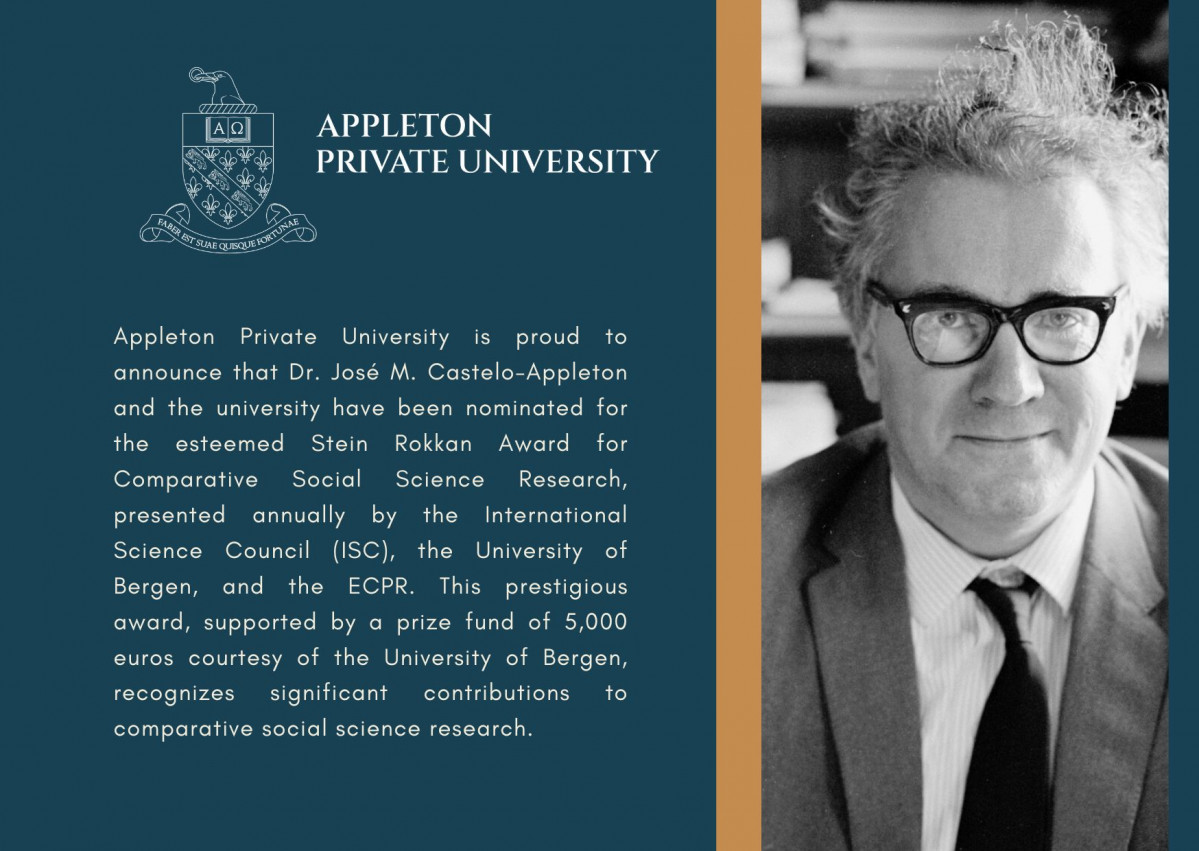Nominados al Prestigioso Premio Stein Rokkan
ART ESP/ING
Appleton Private University se enorgullece en anunciar que el Dr. José M. Castelo-Appleton y la universidad han sido nominados al estimado Premio Stein Rokkan de Investigación Comparada en Ciencias Sociales, presentado anualmente por el Consejo Internacional de Ciencias (ISC), la Universidad de Bergen y el ECPR. Este prestigioso premio, respaldado por un fondo de 5.000 euros cortesía de la Universidad de Bergen, reconoce las contribuciones significativas a la investigación comparada en ciencias sociales.
La nominación reconoce la innovadora investigación del Dr. Castelo-Appleton sobre la "Hipótesis del Entrelazamiento Simbólico-Neuronal" en el campo de la Antropología Social. Este trabajo innovador explora la compleja relación entre los símbolos y el cerebro humano, un tema de profunda importancia para comprender los fundamentos de la cultura y la cognición humanas.
Sin embargo, en un gesto de rigor e integridad académica, el Dr. Castelo-Appleton ha rechazado respetuosamente la nominación. Explicó que la investigación sobre la "Hipótesis del Entrelazamiento Simbólico-Neuronal" aún está en curso y no ha alcanzado una etapa concluyente. Si bien cree firmemente en el potencial de la hipótesis para revolucionar nuestra comprensión de la conexión símbolo-cerebro, considera que actualmente carece de la evidencia definitiva necesaria para justificar un premio tan prestigioso.
"Me siento profundamente honrado por esta nominación del Consejo Internacional de Ciencias", declaró el Dr. Castelo-Appleton. "Sin embargo, creo que es crucial mantener los más altos estándares de rigor académico. Si bien la 'Hipótesis del Entrelazamiento Simbólico-Neuronal' es muy prometedora, la investigación aún está en curso. Aceptar el premio en esta etapa sería prematuro. Debemos continuar esta línea de investigación con diligencia y minuciosidad".
Appleton Private University apoya plenamente la decisión del Dr. Castelo-Appleton. La universidad reconoce su compromiso con la excelencia académica y su inquebrantable dedicación a la búsqueda del conocimiento con la máxima integridad.
Appleton Private University sigue comprometida con el fomento de un entorno de investigación que aliente la innovación, la indagación crítica y la búsqueda del conocimiento con la máxima integridad.
El Premio Stein Rokkan de Investigación Comparada en Ciencias Sociales es otorgado por el Consejo Internacional de Ciencias, la Universidad de Bergen y el Consorcio Europeo para la Investigación Política (ECPR). Gracias a la generosidad de la Universidad de Bergen, está dotado con 5.000 euros y se concede anualmente.
Stein Rokkan fue un pionero de la investigación comparada en ciencias políticas y sociales, reconocido, entre otras cosas, por su trabajo pionero sobre el Estado nación y la democracia. Brillante investigador y profesor de la Universidad de Bergen, donde desarrolló la mayor parte de su carrera, Rokkan fue también presidente del Consejo Internacional de Ciencias Sociales (ISSC) (que se fusionó con el Consejo Internacional para la Ciencia (ICSU) en 2018 para formar el Consejo Internacional de la Ciencia), y uno de los fundadores del Consorcio Europeo para la Investigación Política (ECPR).
-----------------------------
Appleton Private University is proud to announce that Dr. José M. Castelo-Appleton and the university have been nominated for the esteemed Stein Rokkan Award for Comparative Social Science Research, presented annually by the International Science Council (ISC), the University of Bergen, and the ECPR. This prestigious award, supported by a prize fund of 5,000 euros courtesy of the University of Bergen, recognizes significant contributions to comparative social science research.
The nomination acknowledges Dr. Castelo-Appleton's groundbreaking research on the "Symbolic-Neuronal Entanglement Hypothesis" in the field of Social Anthropology. This innovative work explores the complex relationship between symbols and the human brain, a topic of profound importance for understanding the foundations of human culture and cognition.
However, in a gesture of academic rigor and integrity, Dr. José M. Castelo-Appleton has respectfully declined the nomination. He explained that the research on the "Symbolic-Neuronal Entanglement Hypothesis" is still ongoing and has not reached a conclusive stage. While he firmly believes in the hypothesis's potential to revolutionize our understanding of the symbol-brain connection, he considers that it currently lacks the definitive evidence necessary to justify such a prestigious award.
"I am deeply honored by this nomination from the International Science Council," declared Dr. Castelo-Appleton. "However, I believe it is crucial to maintain the highest standards of academic rigor. While the 'Symbolic-Neuronal Entanglement Hypothesis' is very promising, the research is still in progress. Accepting the award at this stage would be premature. We must continue this line of research with diligence and thoroughness."
Appleton Private University fully supports Dr. José M. Castelo-Appleton's decision. The university recognizes his commitment to academic excellence and his unwavering dedication to the pursuit of knowledge with the utmost integrity.
Appleton Private University remains committed to fostering a research environment that encourages innovation, critical inquiry, and the pursuit of knowledge with the utmost integrity.
The Stein Rokkan Award for Comparative Social Science Research is awarded by the International Science Council, the University of Bergen, and the European Consortium for Political Research (ECPR). Thanks to the generosity of the University of Bergen, it
Stein Rokkan was a pioneer of comparative research in political and social sciences, recognized, among other things, for his pioneering work on the nation-state and democracy. A brilliant researcher and professor at the University of Bergen, where he developed most of his career, Rokkan was also president of the International Social Science Council (ISSC) (which merged with the International Council for Science (ICSU) in 2018 to form the International Science Council), and one of the founders of the European Consortium for Political Research (ECPR).

